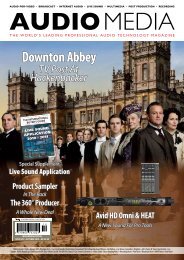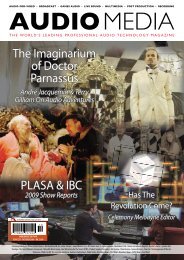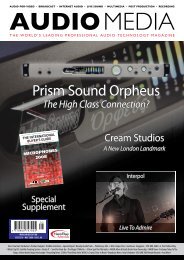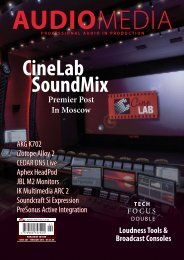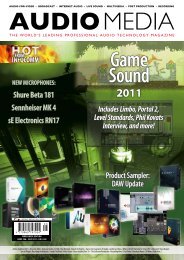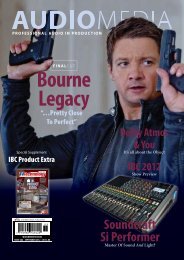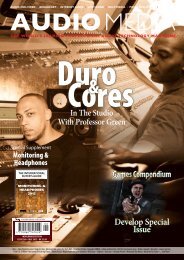Renew Your Audio Media Subscription for 2009!
Renew Your Audio Media Subscription for 2009!
Renew Your Audio Media Subscription for 2009!
You also want an ePaper? Increase the reach of your titles
YUMPU automatically turns print PDFs into web optimized ePapers that Google loves.
Sound Experiences<br />
Ears Right?<br />
Dave Foister challenges some common assumptions about how we ‘hear’ our music,<br />
and asks why our experiences of sound can be so very different.<br />
A<br />
few years ago, a reputable mastering<br />
engineer went on record in a magazine<br />
article stating that he usually found it<br />
diffi cult to tell the difference between mono<br />
and stereo just by listening. Admittedly,<br />
his business apparently suffered after this<br />
startling revelation, but that doesn’t alter the<br />
fact that he’d been doing a perfectly good job<br />
<strong>for</strong> several years. He had worked on a project<br />
of mine, and I’d happily have used him again.<br />
But what it did highlight is how widely our<br />
perceptions of what we’re hearing can vary,<br />
and how wrong our assumptions about what<br />
matters can be.<br />
Of course there’s nothing new in the idea<br />
that appreciation of recorded sound and<br />
audio equipment is very much a subjective<br />
thing. You can measure all you like, but<br />
in<strong>for</strong>med, experienced grown-ups will still<br />
come to blows over which technology,<br />
which technique,<br />
which piece of kit is<br />
‘better’.<br />
As much as<br />
anything else,<br />
this is true of<br />
loudspeakers.<br />
In 1996 the AES<br />
published a paper,<br />
AES20, drawing<br />
up a standard <strong>for</strong><br />
listening tests on<br />
loudspeakers. In<br />
its acknowledgment of all the pitfalls of<br />
assessing equipment just by listening to it,<br />
and in its attempt to eliminate the variables<br />
and establish a framework <strong>for</strong> consistent<br />
and fair tests, it is a brave document.<br />
Most of us will never have the time or<br />
resources to carry out its recommendations<br />
to the letter, but it’s hard to deny the <strong>for</strong>ce of<br />
its arguments and premises. But revisiting it<br />
ADAM S3X-H<br />
the other day, I was struck by some of<br />
the things it regarded as problems, and<br />
some of the assumptions contained in it,<br />
and I was reminded of the a<strong>for</strong>ementioned<br />
hapless mastering engineer’s innocent<br />
but damning admission.<br />
Balanced Opinion<br />
I have a problem with some of the<br />
assumptions that generally seem to be<br />
made about how we hear loudspeakers.<br />
I don’t claim to have Golden Ears by<br />
any means, but some of the aspects of<br />
loudspeaker listening that are supposed to<br />
be problematic don’t seem to bother me,<br />
and I’d like to know if others feel the same.<br />
I don’t get it when people sit in the sweet<br />
spot and can’t localise instruments in the<br />
stereo image, even on rubbish loudspeakers.<br />
It doesn’t seem to matter whether it’s multimiked<br />
or purist,<br />
unless something’s<br />
hard left or right<br />
they just can’t place<br />
it. I don’t get it<br />
when people can’t<br />
hear the stereo<br />
image at all if they<br />
move off-centre; it<br />
sometimes seems<br />
as though only a<br />
foot off to the left,<br />
they stop hearing<br />
anything coming out of the right-hand box.<br />
It doesn’t seem hard to me to compensate<br />
<strong>for</strong> where I am and hear everything where<br />
it should be, even if I’m right off to one side<br />
– not with as much precision perhaps, but<br />
it’s all still there. With all due respect to<br />
our mastering engineer, I don’t get it when<br />
people can’t tell the difference between<br />
stereo and mono; to me, mono is like<br />
8 EARS RIGHT?<br />
listening through a crack in the door, and<br />
stereo is what you get when you fl ing the<br />
doors wide open and march into the room.<br />
Un-Phased<br />
But most of all, I really, REALLY don’t get<br />
it when people can stand in front of (or in<br />
fact anywhere near) a pair of out-of-phase<br />
speakers and not be aware there’s anything<br />
wrong. It’s bad enough in a friend’s living<br />
room, where perhaps a pair of untrained<br />
ears can be <strong>for</strong>given <strong>for</strong> not noticing that<br />
there’s no bass, not even a vague idea of<br />
where anything’s supposed to be, and above<br />
all an agonising feeling that your eardrums<br />
are being sucked out of the sides of your<br />
head, there’s a paint-stirrer in your brain,<br />
and last night’s dodgy curry is about to<br />
wreak its havoc.<br />
It’s also possible to recognise that the<br />
shelf-stackers in a record store are immune<br />
to similar feelings as they wander around<br />
the aisles of CDs between speakers that<br />
were apparently installed by a colour-blind<br />
orang-utan. The fact that some of us can’t<br />
stand to spend more than a few seconds<br />
in those particularly sour spots would be a<br />
complete mystery to them; the fact that it<br />
loses them sales, as potential customers<br />
run gagging from the shop, should bother<br />
them, but clearly doesn’t. Likewise the<br />
home electronics stores, but I suppose<br />
that shouldn’t be a surprise; if they can<br />
cheerfully display a whole wall of TVs where<br />
no two pictures are even slightly similar,<br />
then the proudly-displayed stereo with its<br />
speakers wired in opposite polarity isn’t<br />
going to phase them at all.<br />
But when people who consider<br />
themselves to be audio people don’t notice,<br />
I have to wonder what exactly we’re all<br />
experiencing as those little variations in air



